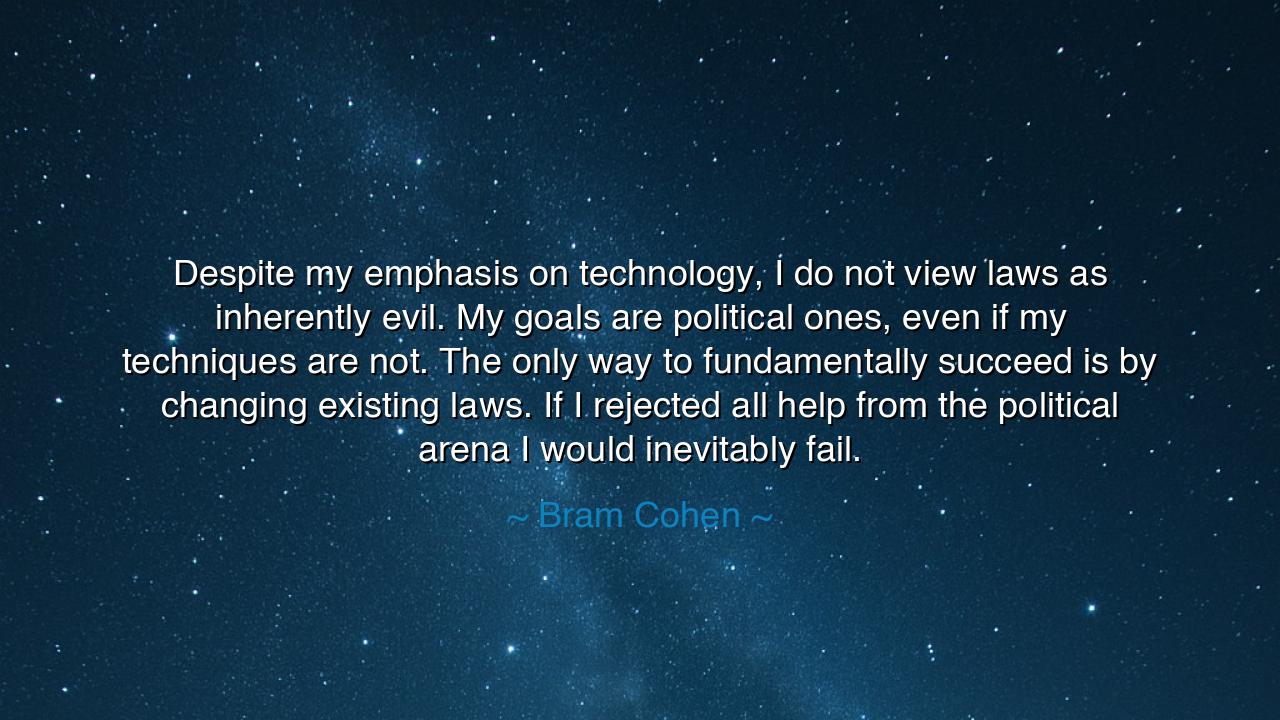
Despite my emphasis on technology, I do not view laws as
Despite my emphasis on technology, I do not view laws as inherently evil. My goals are political ones, even if my techniques are not. The only way to fundamentally succeed is by changing existing laws. If I rejected all help from the political arena I would inevitably fail.






The words of Bram Cohen, “Despite my emphasis on technology, I do not view laws as inherently evil. My goals are political ones, even if my techniques are not. The only way to fundamentally succeed is by changing existing laws. If I rejected all help from the political arena I would inevitably fail,” strike with the force of a sober revelation. Here speaks the creator of BitTorrent, a man who reshaped the flow of information through the sheer power of technology, yet who acknowledges that technology alone cannot alter the deeper structures of society. His words remind us that even the most brilliant inventions must one day encounter the authority of law, and that true change requires not only technical genius but political wisdom.
The origin of these words lies in Cohen’s experience as a pioneer of peer-to-peer networks. His technology made it possible for vast amounts of data to be shared efficiently, challenging old models of control and distribution. Many celebrated this as liberation; others condemned it as piracy. Cohen, caught between the ideals of technological freedom and the reality of legal frameworks, realized that to bring lasting change, he could not rely solely on algorithms and protocols. He had to engage the political arena, for without altering the laws themselves, innovation would always stand on unstable ground, threatened by courts and legislation.
History teaches us that this struggle is not new. Galileo Galilei, armed with the telescope, revealed truths about the heavens that challenged the authority of the Church. His technology unveiled reality, but it was the laws and decrees of men that condemned him to silence. Though his discoveries were true, they were shackled by the powers of his age. Similarly, Nikola Tesla’s visions of wireless energy and free power were stifled not by lack of genius, but by the legal and economic frameworks that resisted them. Cohen’s words carry the same warning: without the transformation of law, even the boldest creations risk being smothered.
The deeper meaning of Cohen’s declaration is that technology and politics are bound together like body and soul. The tool without justice is vulnerable, and justice without tools is powerless. To reject law entirely, to view it as only an enemy, is folly. For though law may at times be oppressive, it also has the power to enshrine freedom, to protect innovation, to legitimize what once was resisted. The wise innovator does not wage war against law, but seeks to reshape it, bending it toward fairness and truth.
This teaching is also a call to humility. Many dreamers believe that invention alone can topple systems, that a single algorithm or device can render old structures irrelevant. But Cohen reminds us that no matter how disruptive, every technology must eventually dwell within a social order, and that order is governed by rules, by agreements, by laws. To ignore this is to walk toward inevitable defeat. The true visionary, therefore, is not only a builder of tools but a shaper of institutions.
For those who live today, the lesson is clear: if you wish to change the world, do not despise the slow workings of politics. Engage with it, even when it frustrates you. Seek allies, craft arguments, and work for the transformation of the laws that govern society. Without this, your work may flash like lightning and vanish, but with it, your vision may endure like the steady flame of the sun. Just as Cohen admitted his reliance on political change, so too must we acknowledge that true victory comes not from standing apart, but from weaving our efforts into the fabric of society.
So let this wisdom be passed down: technology alone cannot save us, nor can law alone. The path to transformation lies in their union—innovation guided by justice, and justice empowered by innovation. As Bram Cohen declares, one must not reject the political arena, for it is there that the permanence of change is secured. Walk, then, with patience and strategy: build your tools, but also build the laws that will protect them. For only then will your vision rise not as a fragile dream, but as a foundation for generations to come.






AAdministratorAdministrator
Welcome, honored guests. Please leave a comment, we will respond soon